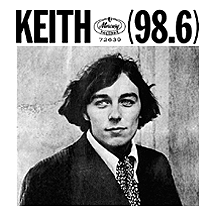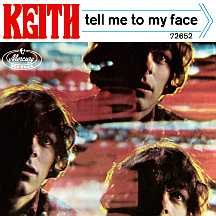KEITH
98.6
Jerry Ross arrived on the Philadelphia music scene in 1957, working as a disc jockey for the city's hottest radio station, WFIL, in addition to a stint as Dick Clark's announcer during the early days of American Bandstand. In the early 1960s, he set up his own Heritage label, "borrowing" Chubby Checker's backing vocalists The Dreamlovers (who surprisingly didn't have a contract with Cameo-Parkway, Philly's largest record company and Checker's hitmaking headquarters); Jerry produced "When We Get Married," a top ten hit for the group in the summer of '61. A partnership with Kenny Gamble led to some enticing records he produced for The Sapphires (including the 1964 hit "Who Do You Love," which he wrote with Gamble) in addition to "The 81" by Candy and the Kisses and other soulful mid-'60s hits.
Philadelphia-born James Barry Keefer was well aware of Ross's local celebrity, having followed his concurrent careers in radio, television and music production. Living in Philly suburb Clifton Heights during his mid-teens, he sang with a local a cappella group called Barry and the Bel-Airs, which led to an audition with Ross. "Caravan of Lonely Men," credited to Keith and the Admirations and produced by Ross, appeared as a one-shot on Columbia Records in the spring of 1965, just in time for Keefer's 16th birthday. The song's early-'60s pop sound was a little out of sync with the British Invasion and folk rock direction of the time; its failure put James's singing career on hiatus during which time he and Jerry wrote some songs together.
Early in 1966, Ross was hired as director of A&R for Mercury Records and its subsidiaries Philips and Smash. He scored immediately with Bobby Hebb's self-penned breakthrough "Sunny," arranged by Joe Renzetti. At about this time, Ross signed Keefer to Mercury. Just as "Sunny" was hitting the top of the charts, a belated second single by the young singer (now a solo act retaining the nickname Keith) made its national debut. "Ain't Gonna Lie," a midtempo pop song written by Tony Powers and George Fischoff with uncredited backing vocals by The Tokens, was a very big hit in several eastern U.S. cities. Mercury was unable to extended its reach from one coast to the other and points in between; still, the song made it to the top 40 in November 1966.
The Powers-Fischoff team also supplied his next release, "98.6" (again relegating the Tokens to the background). A breakout during the '66 holiday season, it worked its way into the national top ten by February '67 (in England, Keith faced competition from a version by Welsh group The Bystanders, but his original ultimately outperformed the U.K. band's cover). In the song's lyrics, '98.6' was used in place of a girl's name, though perhaps the line 'hey 98-point-6, it's good to have you back again' could be interpreted as the happiness one feels when temperature returns to normal after a sickness...a condition often tied to romantic emotion in love songs. Certainly no one had a problem with the song's vaguely ambiguous lyrics; the hook was catchy, Keith's voice was appealing. The record was one of Mercury's top sellers that winter.
"Tell Me to My Face," composed by Allan Clarke, Tony Hicks and Graham Nash of The Hollies, first recorded and released on their album Stop! Stop! Stop!, was covered by Keith for his third single. Renzetti's arrangement had a Middle Eastern flavor and in April it became his third consecutive top 40 hit. "Daylight Savin' Time," penned by Ross and Mort Shuman, was a minor chart single in June '67, followed by four far less popular 45s over the next year. At the two-year mark, Mercury canceled Keith's contract. In 1969 he recorded two singles and an album for RCA Victor but entered the '70s without a record deal or, it would seem, a specific musical direction.
After producing and/or composing hits for Dee Dee Warwick, Jerry Butler, Spanky and Our Gang, Jay and the Techniques and many others, Jerry Ross left Mercury. He reinstated Heritage Records (dormant since 1962), finding some success with acts like The Cherry People and Bill Deal and the Rhondels, later striking gold with his Colossus label and Dutch groups The Shocking Blue, The Tee Set and The George Baker Selection. Keith hooked up with Frank Zappa's Mothers of Invention (just after Howard Kaylan and Mark Volman of The Turtles had served time with the innovative "Uncle Meat"); his single "In and Out of Love," a remake of a song by Bobby Vee, was released on Zappa's DiscReet label in 1974.



